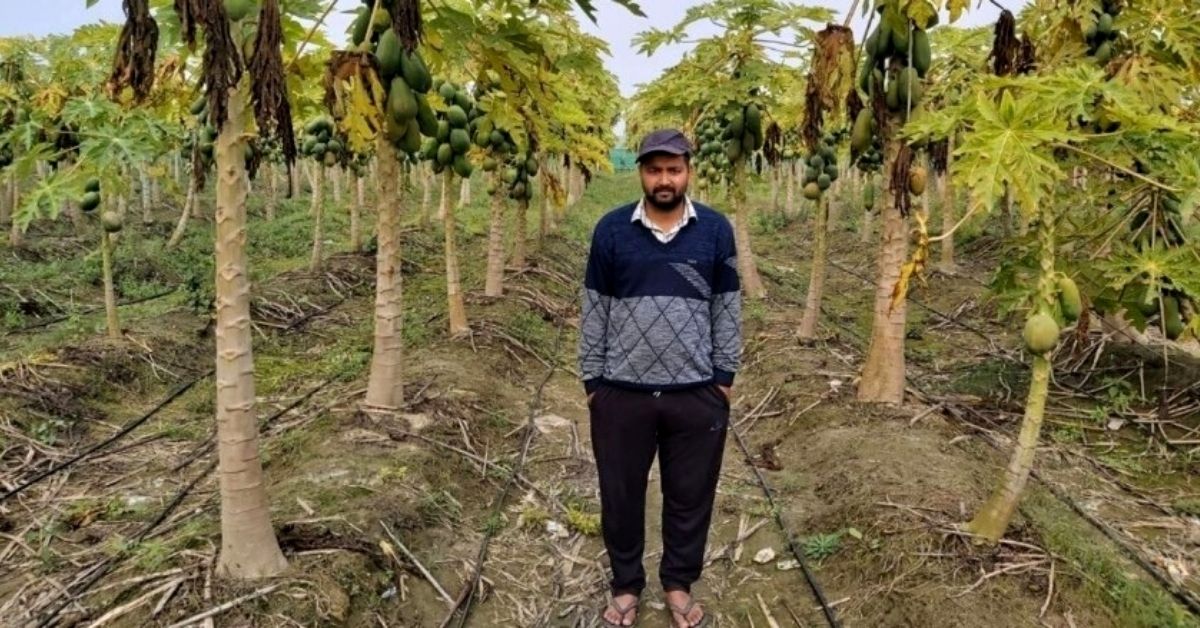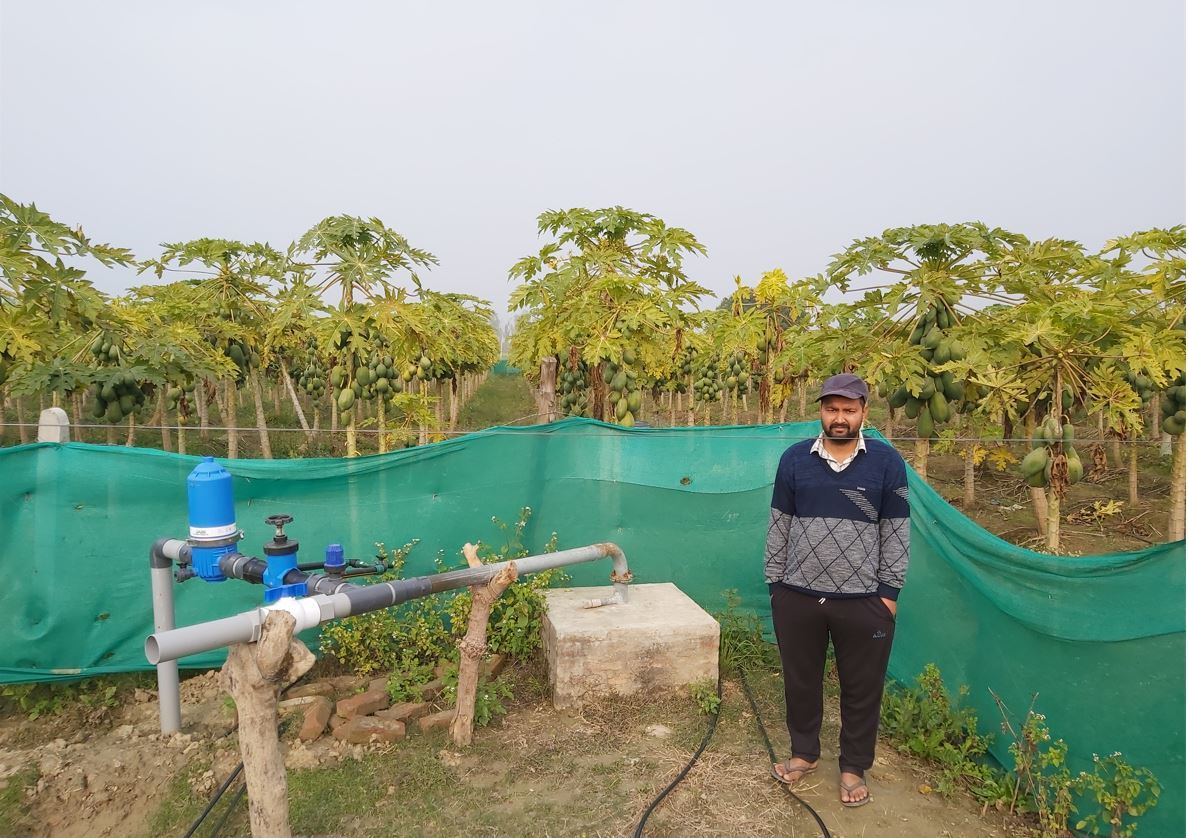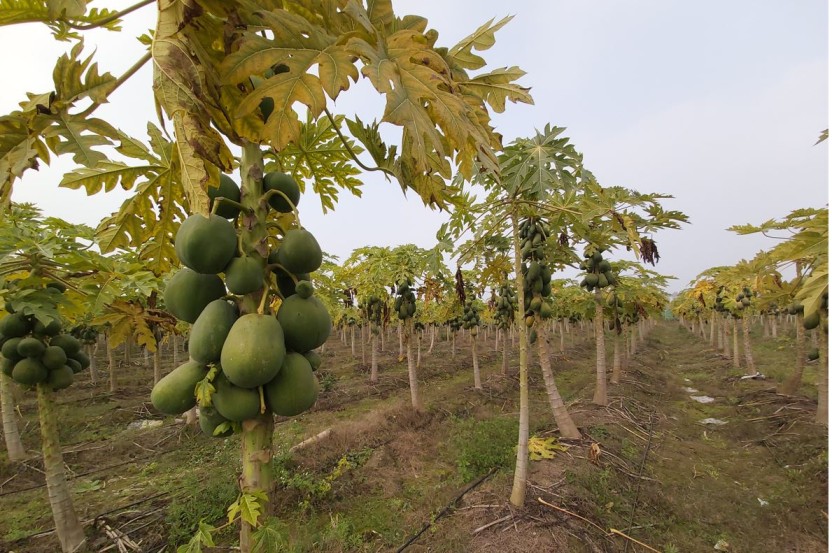Techie Rediscovers Joy of Farming When Working From Village, Earns Rs 15 Lakh
Someshwar Singh from Uttar Pradesh went back to his village during the lockdown. While he has no plans to quit his corporate job, he elaborates how farming is just what he needed.

Amethi’s Someshwar Singh, who was working as an engineer in Noida, is one of the few who tried their hands at farming during the COVID-19-induced lockdown. Today, he has a four-acre papaya farm that yields a revenue of about Rs 15 lakh a year.
Working for an international technology company in the Noida branch as an executive engineer since 2018, he earns more than Rs 1 lakh a month from his corporate job. “Before that, I worked for two to three technology companies where I experienced a lot of work pressure,” says Someshwar.
Hailing from a small village called Madhupur Khadri in the Amethi district of Uttar Pradesh, Someshwar finished his college at Shri Shiv Pratap Inter College and then went to Ghazipur’s Ideal Institute of Engineering for his electronic engineering degree.
“I belong to a farmer’s family. My father, despite clearing Class 12, has been farming from a young age. So coming from such a humble family, you have only one dream — to study hard and get a better job. Thankfully I managed to do that,” says Someshwar.
However, the coronavirus lockdown made him go back to his roots. He returned to his village on 17 March 2020 and started working from home. “In my childhood, I used to spend my time on my father’s farm, so I know a little bit of farming,” he adds. So, during his free time, while working from home from his native place, he decided to give farming another try.
After a lot of research as to which crop would be better to harvest, he realised papaya farming could be beneficial. “Very few were growing papaya in my district. So there was no competition for sales or better prices. I researched a lot from watching YouTube videos and reading online to know better ways of papaya farming,” added Someshwar.

By March 2021, he bought about 5,000 papaya saplings called ‘Red Lady 786 Papaya Taiwan’ and used his four acres of farmland (out of a total of 8 acres) for planting them. While talking about what techniques he used in farming, Someshwar says that first, he laid down 75 tonnes of cow dung for better fertility of the soil and then made a lot of beds on the farm surface. Then he planted the papaya saplings. The distance between two beds was 6 feet and between two plants was 8 feet.
Sharing tips, he says, “While irrigating, we should make sure that the beds are not wet or moisturized or else it will affect the plant’s growth which may ruin it. That is why I also set up drip irrigation with the help of district officials who gave me a 90 per cent discount.”
He says that the drip irrigation project costs Rs 3.30 without the subsidy.
Someshwar further adds, “I use Neem oil instead of toxic pesticides, but sometimes I have to use less harmful pesticides called ImidaCloprid to save the crop from viruses. In this regard, my crops are 70 per cent organic. The pesticide I use has a residue period of about 15 days, so by the time they reach the end customer the effect of the pesticide is void.”
In six months, his plants started giving papaya fruits. “The harvesting is done once a week and I managed to sell about 20-25 quintals in one harvest. For 1kg of the fruit, I earn Rs 20 on average.”
He adds, “Sometimes I harvested fruits five times a month. So, in six months I managed to recover my Rs 6 lakh investment for the plants, cow dung and other costs. It has been a year now and I managed to earn nearly thrice what I had invested.”
Since Someshwar was investing lakhs in farming, his parents were scared and deterred him from pursuing it. “Their concerns were not wrong. As a farmer, they have seen adversities in farming from their experience as well as other farmers. But I went with my gut feeling and now my family is happy with my decision. Now, they don’t have any problem and are motivated to follow suit.”
While talking about how corporate life and farming are different, Someshwar says that in the corporate world one has to be available for about 9 hours in the office. “Of course, there is pressure involved when you are working 9 hours every day. You don’t have much time for family and friends. On the other hand, with farming, you have all the freedom you need. I generally spend only 3-4 hours a day in the field. I have 5-10 contract labourers who occasionally do some work on the farm. This reduces my burden further,” he says.
He further adds that living with family and staying at his native place helped him better his mental health.

Those who want to take up farming should do it from a different perspective, he says. “Farmers should pursue organic farming as much as possible because as farmers we can’t sell toxic food to people. Moreover, farmers should not grow what other farmers are growing. Rather, different farmers should grow different crops which reduces the competition and also gives you better prices. Moreover, farmers should also educate themselves. The more you learn the more you can improve in farming and hence earn better,” he opines, adding, “Don’t be afraid of taking a risk in farming.”
With no plans to quit his corporate job, with his father giving him a helping hand on the farm, he says, “I will try to spend as much time as possible in the field. I will also experiment with different crops as I have a huge farm.”
He also says that since he is earning better from papaya farming, three to four farmers in his village, who have huge farmlands, are also planning to cultivate papayas. “I help them with techniques and suggestions because I have done a lot of research in this regard. I want other farmers to succeed too,” he concludes.
(Edited by Yoshita Rao)
If you found our stories insightful, informative, or even just enjoyable, we invite you to consider making a voluntary payment to support the work we do at The Better India. Your contribution helps us continue producing quality content that educates, inspires, and drives positive change.
Choose one of the payment options below for your contribution-
By paying for the stories you value, you directly contribute to sustaining our efforts focused on making a difference in the world. Together, let’s ensure that impactful stories continue to be told and shared, enriching lives and communities alike.
Thank you for your support. Here are some frequently asked questions you might find helpful to know why you are contributing?


This story made me
-
97
-
121
-
89
-
167











